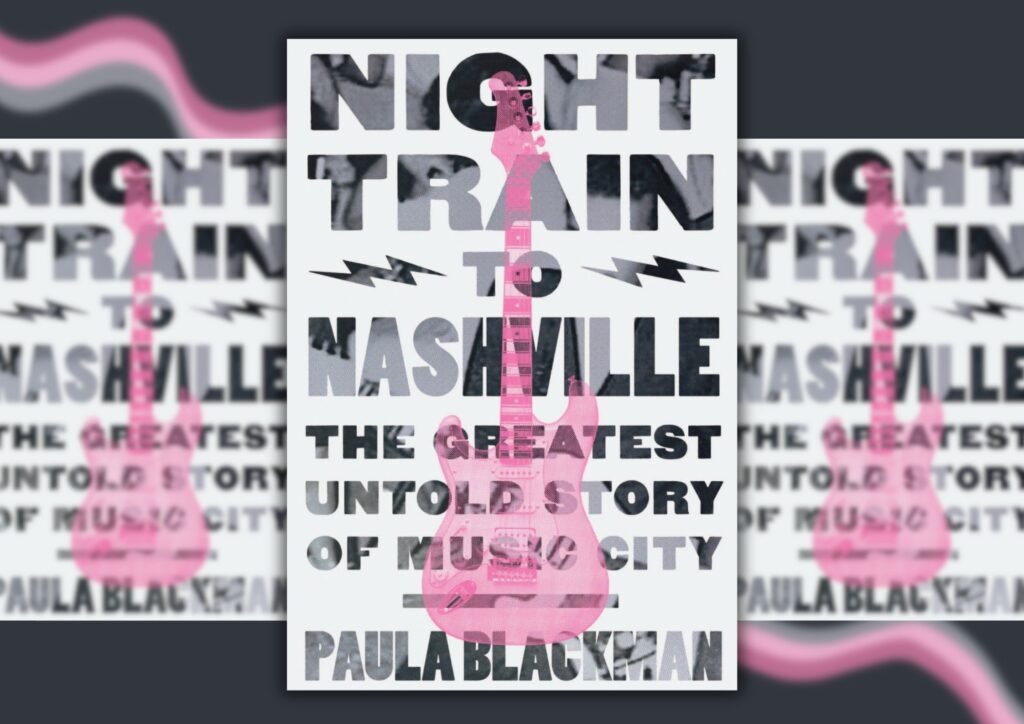Midnight Melodies: Unearthing Nashville’s Secret Sound in Night Train to Nashville, The Greatest Untold Story of Music City

Blackman’s writing feels as though you are present with her, sitting on a southern porch with a glass of sweet tea, listening to her grandfather in a rocking chair with a photo album reminiscing about how music brought two disparate communities together—Black and White during the 1940s to the 1960s in Nashville, Tennessee.
Paula Blackman’s Night Train to Nashville: The Greatest Untold Story of Music City (Harper Horizon, 2023) is a sentimental love letter to Nashville and to her grandfather, E. Gab “Blackie” Blackman. This heartfelt work of historical fiction explores the art of creative nonfiction by blending the stories Paula was told as a child and years of research around the history of WLAC, the historic Tennessee radio station that helped introduce R&B to the world, and more specifically the friendship between her grandfather and a Black man, William Sousa “Sou’ Bridgeforth as authentically as possible.
Blackman’s writing feels as though you are present with her, sitting on a southern porch with a glass of sweet tea, listening to her grandfather in a rocking chair with a photo album reminiscing about how music brought two disparate communities together—Black and White during the 1940s to the 1960s in Nashville, Tennessee. Notably, the author takes on the issue of white saviorism in relation to historical movements, often related to the rise of black voices in popular culture and the commercialization without fair compensation of Black artists.
Against the backdrop of Jim Crow, Night Train to Nashville unveils one of music’s most riveting yet overlooked sagas, illuminating the era of segregation and Civil Rights. In a different epoch, E. Gab Blackman and William Sousa “Sou” Bridgeforth might have been inseparable, akin to brothers.
Blackman argues that neither Gab nor the owner of WLAC, Truman Ward, are to be credited with saving radio by launching the first national broadcast of Black musicians. She evinces that truly, “Black musicians saved radio” when nationally most people believed that television would kill the medium. In order to tell the story in the most genuine way possible, Blackman invited Sou’s daughter, Harriet Bridgeforth Jordon, to become her storytelling partner and share memories of her grandfather’s experience and the Black community. This creative partnership spawned a story told from the perspective of both races, alternating between the experiences of “Blackie” and “Sou.” Against the backdrop of Jim Crow, Night Train to Nashville unveils one of music’s most riveting yet overlooked sagas, illuminating the era of segregation and Civil Rights. In a different epoch, E. Gab Blackman and William Sousa “Sou” Bridgeforth might have been inseparable, akin to brothers. But 1950s Nashville entrenched them in a racial schism.
Gab, a visionary albeit opportunistic radio executive, discerned an uncharted realm: a burgeoning R&B scene flourishing in Black clubs across the city. Defying industry norms, cultural barriers, governmental pressures, and familial expectations, he embarked on a daring mission to beam Black music to a national audience. Sou, the esteemed luminary of Black Nashville and scion of enslaved ancestors, spearheaded this movement into the latter half of the twentieth century. His New Era Club, nestled in the heart of Black Nashville, surged in the wake of newfound radio exposure. With the ascendance of Black R&B, integrated gatherings and clandestine concerts proliferated throughout the city, confronting a perilous juncture. Could a segregated society ever reconcile its divisions and forge genuine unity?
Set amidst one of America’s most tumultuous epochs, Night Train to Nashville delves into how a city, cleaved into disparate and unequal enclaves, showcased the transformative potency of music. The chapters are loaded with southern charm and cherished relics, anecdotes, and photographs of days past. However, if you’re looking for historical accuracy and reliability, note that this is a work of creative nonfiction, and while the novel is loaded with interesting facts, much of Blackman’s narrative relies heavily on recounting the stories with fictional dialogue. While this chapter of American music might benefit from a more historically accurate depiction, Night Train to Nashville is an enjoyable and informative read for lovers of music history.
Order a copy here.

